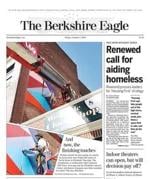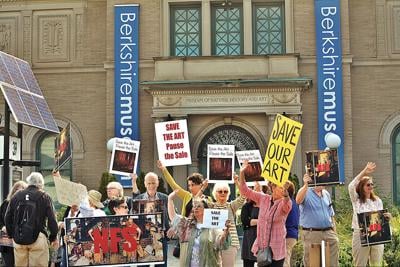PITTSFIELD — A group that emerged Friday has company in wanting the Berkshire Museum to hit the brakes on a planned auction.
But what it put on the table may stand alone: $1 million.
The anonymous group, made up of at least three people who communicated their offer through The Eagle, pledged to contribute up to $1 million to the Pittsfield museum if its board agrees to pause an auction of 40 works of art at Sotheby's and to allow outside experts to provide a second opinion on the advisability of the controversial sale.
Elizabeth McGraw, president of the museum's board of trustees, said the offer falls short.
"Although we must decline, we are grateful for the offer," McGraw said in a statement, in response to questions from The Eagle.
She faulted both the nature of the proposed donation and its conditions.
The money would be given only if the board suspends the auction for up to a year while the donors moved swiftly to convene an outside panel to study the institution's financial condition.
Its members would review the circumstances that led the board to announce July 12 it plans to sell works of art to avert a financial crisis that could force it to close in six to eight years and to "reboot" the museum experience for patrons.
"The board of trustees cannot respond to an offer that has not been made directly to them in writing, with details and definitive terms," McGraw said of the proposal.
She said the board welcomes any "concrete, substantive offer from a specific individual, group of individuals, or entity, provided it directly addresses completely and immediately the urgency and magnitude of our present and future needs and is submitted directly to the Board of Trustees."
McGraw suggested that no second opinion is needed, given the research conducted by her team.
"The work preceding our decision to embark on a New Vision has been thorough and comprehensive. It would not be appropriate for me to ask my fellow board members to cover ground that we have already covered," she said.
Before Friday, Berkshire Museum leadership has said consistently that no one has stepped forward with an alternative financial solution to its problem. But The Eagle has learned at least two other groups of people have done just that in recent weeks.
Some of the ideas were presented to museum leaders, who rejected them. At least one other idea brought to the attention of museum Executive Director Van Shields was not responded to, sources said.
All sources contended their ideas would have relieved the financial burden Berkshire Museum faces and allowed some, or all, of the 40 artworks the museum plans to auction to remain in its possession.
Works to be sold include two Norman Rockwell paintings the artist donated to the museum, "Shuffleton's Barbershop" and "Shaftsbury Blacksmith Shop."
The museum has said it expects to raise $50 million. The sales will take place in auctions over six months starting in November, according to Lisa Dennison, chairwoman of Sotheby's Americas.
A spokesperson for the group of donors that emerged Friday said the group wanted to reconsider the need for the art sale and to examine the institution's underlying economics.
The museum's board says it needs proceeds from the auction to strengthen its endowment and assure its future. Leaders say they would steer an estimated $40 million — the bulk of the auction proceeds — into an endowment now valued at about $8.6 million.
The outside panel would also review planned renovations and program changes and consider whether the museum's re-invention plan is in the best interests of the community.
The volunteer panel would be made up of people with expertise in art, finance and nonprofit management, according to the donors.
Under the offer, the auction would be suspended until the outside group makes recommendations to the museum board.
At that point, it would remain the board's duty to chose the best path for the 39 South St. museum, founded in 1903 by Zenas Crane.
The donors are willing to provide funding as soon as possible, the spokesperson said, and would work to shape the volunteer commission within weeks. That person also spoke on condition of anonymity.
The donors are described as people of "impeccable" financial status and are adamant they remain unnamed.
Sotheby's penalty
Even if the board were interested, a key question is whether the offer comes too late.
Shields, the museum's executive director, previously told The Eagle that its agreement with Sotheby's does not allow works to be removed from a planned auction.
The Eagle this week reviewed terms of an unrelated Sotheby's consignment contract from this month. It states that the penalty for withdrawing a work or works from sale after a contract is signed is 20 percent of the midpoint between the low and high estimates.
The museum did not respond to questions Friday about the withdrawal terms of its contract with Sotheby's.
If auction prices for the museum's works come in at the midpoint of estimates, the standard 20 percent withdrawal penalty listed on the consignment contract terms shared with The Eagle would come to $10 million.
If the Sotheby's withdrawal penalty had arisen as a stumbling block to a pause, the donors had said they were interested in approaching the auction house on the museum's behalf, seeking terms that allow for the pause, the spokesperson said.
The auction house sets what one former Sotheby's employee called "a tight [and] prohibitively high withdrawal clause exactly to dissuade sellers from pulling out their art from the sale/catalogue."
The former employee, who spoke with The Eagle on the condition of anonymity, said the high withdrawal penalties are used to protect the auction house from losing money after investing in travel expenses and advertising.
"Even if other seller fees are waived for a major consignment, this one probably wouldn't be," the employee said of the Berkshire Museum consignment. "Sounds like a done deal."
Daniel Farrell, an art adviser and appraiser from Old Chatham, N.Y., who has worked with the PBS program "Antiques Roadshow," said all contracts are negotiable, so the standard withdrawal terms of 20 percent might not have applied to the Berkshire Museum consignment.
"That's in the boilerplate but that of course could be negotiable," Farrell said.
Sotheby's contract allows the auction house to withdraw works from sale for a variety of reasons. But sellers get far less latitude.
Sellers are spared penalties if a work is damaged before sale or if doubt arises about its authenticity.
Farrell said he believes both the museum and Sotheby's would be interested in avoiding bad publicity stemming from a dispute about a withdrawal fee.
"The force of public opinion and negative publicity are the most powerful arguments on both sides to abrogate this sale," he said.
Leslie Ferrin, owner of Ferrin Contemporary & Independent Art Projects in North Adams and Cummington, is helping to manage a Facebook group opposed to the art sale. She expressed hope that Sotheby's might be willing to forgo imposing a financial penalty on the museum.
"It can happen. You sign contracts. You back out of contracts," Ferrin said, "and find a way out that is amenable to both parties."
The 114-year-old museum's collection encompasses 440 paintings, 277 works on paper, 248 Asian works and 91 sculptures, among other pieces. The 40 works to be auctioned represent 1.67 percent of the museum's 2,395 fine art pieces.
Eagle reporter Carrie Saldo contributed to this report.
Reach staff writer Larry Parnass at 413-496-6214 or @larryparnass.


